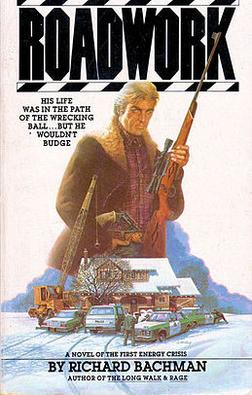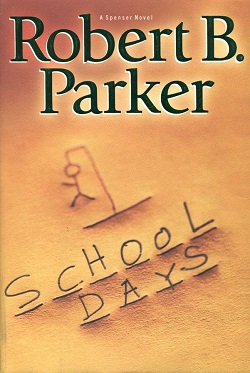
Richard Bachman is a pen name of American horror fiction author Stephen King, first adopted in 1977 for the novel Rage. King hid the link between himself and Bachman, until allowing for his identification in 1985. He collected the first four Bachman novels into The Bachman Books. Rage became controversial for being about a school shooting and was allowed to go out of print after the 1997 Heath High School shooting. Three more novels were published under the Bachman name.

A school shooting is an armed attack at an educational institution, such as a primary school, secondary school, high school or university, involving the use of a firearm. Many school shootings are also categorized as mass shootings due to multiple casualties. The phenomenon is most widespread in the United States, which has the highest number of school-related shootings, although school shootings have taken place elsewhere in the world.

The Bachman Books is a collection of short novels by Stephen King published under the pseudonym Richard Bachman between 1977 and 1982. It made The New York Times Best Seller list upon its release in 1985.

Roadwork is a thriller novel by American writer Stephen King, published in 1981 under the pseudonym Richard Bachman as a paperback original. It was collected in 1985 in the hardcover omnibus The Bachman Books. The story takes place in an unnamed city of the Midwestern United States in 1972–1974. Grieving over the death of his son and the disintegration of his marriage, a man is driven to mental instability when he learns that both his home and his workplace will be demolished to make way for an extension to an interstate highway. A film adaptation of the novel was announced in August 2019, with Pablo Trapero as director and Andy Muschietti and Barbara Muschietti as producers.
The Red Lake shootings were a spree killing that occurred on March 21, 2005, in two places on the Red Lake Indian Reservation in Red Lake, Minnesota, United States. That afternoon, 16-year-old Jeff Weise killed his grandfather and his grandfather's girlfriend at their home. After taking his grandfather's police weapons and bulletproof vest, Weise drove his grandfather's police vehicle to Red Lake Senior High School, where he had been a student some months before.
San Gabriel High School (SGHS) is a public high school located in Los Angeles County, California and operated by the Alhambra Unified School District. It is almost entirely in the city limits of Alhambra with a small portion in the city limits of San Gabriel.
The Frontier Middle School shooting was a school shooting that occurred on February 2, 1996, at Frontier Middle School in Moses Lake, Washington, United States. The gunman, 14-year-old Barry Dale Loukaitis, killed his algebra teacher and two students, and held his classmates hostage before a gym coach subdued him.
The Heath High School shooting occurred at Heath High School in West Paducah, Kentucky, United States, on December 1, 1997. 14-year-old Michael Carneal opened fire on a group of students, killing three and injuring five.
The Platte Canyon High School hostage crisis was a hostage taking and shooting at Platte Canyon High School in Bailey, Colorado, on September 27, 2006. The gunman, 53-year-old Duane Roger Morrison, took seven female students hostage and sexually assaulted them, later releasing four. When police broke open the classroom's door with explosives, Morrison opened fire with a semi-automatic pistol before shooting hostage Emily Keyes in the head. The other remaining hostages escaped unharmed, and paramedics confirmed that Morrison had committed suicide shortly before police were able to enter the classroom. Keyes was pronounced dead at 4:32 p.m. MDT at Saint Anthony's Hospital in Denver, Colorado, after undergoing emergency surgery.

The Jokela school shooting also known as the Jokela High School massacre occurred on 7 November 2007, at Jokela High School in the town of Jokela, Tuusula, Finland. The gunman, 18-year-old Pekka-Eric Auvinen, entered the school that morning armed with a semi-automatic pistol. He killed eight people and wounded one person in the toe before shooting himself in the head; twelve others were also injured by flying glass or by spraining their ankle(s) in the subsequent chaos that ensued. Auvinen died later that evening in a Helsinki hospital.

School Days (2005) is a work of detective fiction by American author Robert B. Parker, the 33rd in his acclaimed Spenser series.
Jackson County High School (JCHS) is a public high school which was established in 1967 and is located in the City of McKee, KY. It serves around 600 students in Jackson County, KY and McKee, KY in grades 9th through 12th. The school is located at the Jackson County Educational Complex which also consists of the Jackson County Area Technology Center, Jackson County Community Auditorium, a football stadium, baseball/softball fields, and the Jackson County Continuing Education Center.

Detention: The Siege at Johnson High is a 1997 American made-for-television thriller drama film based on the 1992 Lindhurst High School shooting and siege that resulted in the death of four people. The film, written by Larry Golin and directed by Michael W. Watkins, stars Rick Schroder, Freddie Prinze Jr., Katie Wright, Alexis Cruz and Henry Winkler. It was originally broadcast on ABC on May 19, 1997.
The East Carter High School shooting occurred on January 18, 1993, in Grayson, Kentucky, United States. The incident occurred when 17-year-old Gary Scott Pennington walked into an English classroom and fatally shot his teacher Deanna McDavid and head custodian Marvin Hicks, and held classmates hostage for 15 minutes before surrendering to police.
The Lindhurst High School shooting was a school shooting and subsequent siege that occurred on May 1, 1992, at Lindhurst High School in Olivehurst, California, United States. The gunman, 20-year-old Eric Houston, was a former student at Lindhurst High School. Houston killed three students and one teacher and wounded nine students and a teacher before surrendering to police. Houston was sentenced to death for the murders, and he is currently on California's death row in San Quentin State Prison.
Since the 1994 film Natural Born Killers was released, several attacks suspected to be copycat crimes have been committed by fans of the film, mostly by high school students within the age range of 15 to 18. Though apparent links have been claimed between the film and most of the incidents described below, certain causality has not been proven.

Tyrone Mitchell was an American spree killer who fatally shot a student and a passerby as well as wounding twelve others who were leaving 49th Street Elementary School in Los Angeles on February 24, 1984. Mitchell then committed suicide by shooting himself in the head with a double-barreled shotgun.

"Guns" is a non-fiction essay written by American writer Stephen King on the issue of gun violence, published in 2013.

On February 3, 2014, 15-year-old high school student Sergey Gordeyev opened fire at School No. 263 in Otradnoye District, Moscow, Russia, killing a teacher. Gordeyev then took 29 students hostage, killed one police officer, and injured another. Later on, he surrendered to the authorities. It is the second reported school shooting in Russia's modern history.

The Uvalde school shooting was a mass shooting that occurred on May 24, 2022, at Robb Elementary School in Uvalde, Texas, United States, when 18-year-old Salvador Ramos, a former student at the school, fatally shot 19 students and two teachers, while 17 others were injured but survived. After shooting and severely wounding his grandmother at their home earlier that day, Ramos drove to and entered the school, remaining in an adjoining classroom for more than an hour before members of the United States Border Patrol Tactical Unit fatally shot him after they bypassed numerous local and state officers who had been in the school's hallways for over an hour.











